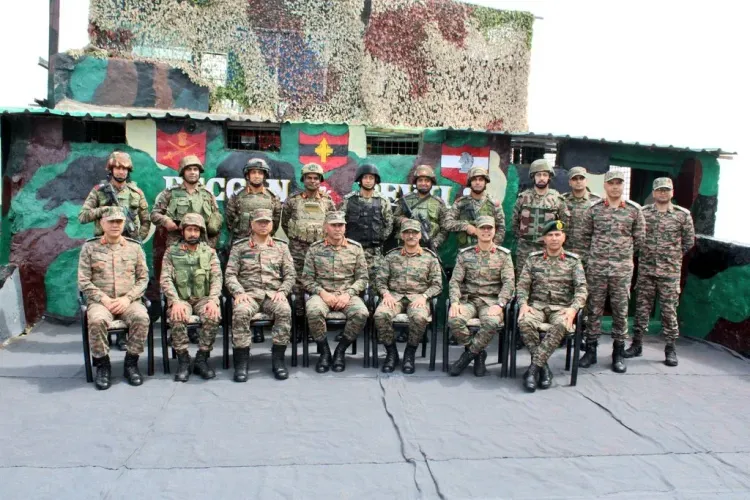What Did the Northern Army Commander Discover During His Review of the Bimber Gali Brigade?

Synopsis
Key Takeaways
- Lieutenant General Pratik Sharma conducted a review of the Bhimber Gali Brigade.
- The visit focused on assessing force effectiveness and threat response mechanisms.
- Poonch has seen a rise in terror incidents over the past three years.
- Approximately 50 terrorists are reported active in the Jammu region.
- The situation remains under control despite ongoing threats.
New Delhi, July 13 (NationPress) The General Officer Commanding-in-Chief of Northern Command, Lieutenant General Pratik Sharma, visited the Bhimber Gali Brigade in Jammu and Kashmir's Poonch on Sunday to evaluate the current operational dynamics and preparedness.
Accompanying him were GOC White Night Corps Lieutenant General P. K Mishra and GOC Ace of Spades Major General Kaushik Mukherjee.
The Northern Command's official handle on X stated, "The visit was aimed at assessing force effectiveness and threat response mechanisms to ensure complete dominance over the operational space."
During this visit, the Northern Command Chief engaged with all ranks, encouraging them to uphold high operational readiness, morale, and professionalism in light of emerging challenges.
On July 11, both Lt Gen Pratik Sharma and Lt Gen P.K. Mishra also inspected the forward posts along the Pir Panjal Range to evaluate the operational environment and strategies for counter-insurgency and counter-infiltration.
The focus was on ground posture and threat response mechanisms. The Bhimber Gali region, part of the Poonch sector, has experienced a surge in terror incidents over the past three years, including a significant ambush in April 2023 along the Bhimber-Poonch route, where five Rashtriya Rifles (RR) soldiers lost their lives due to a terrorist assault on their convoy.
In addition to Poonch-Rajouri, areas like Kishtwar, Basantgarh, Doda, and Udhampur have also faced terror attacks in recent years.
Once declared free from militancy, the Rajouri-Poonch region has now become a prime location for terrorist hideouts.
In the early hours of May 6-7, during Operation Sindoor, Bhimber Gali was one of the initial targets of Pakistan's artillery.
Although the situation in this bordering area, which includes dense forests used by militants for refuge, remains calm, reports indicate that approximately 50 terrorists are currently active in the Jammu region, with about 80 percent of them based in Pakistan.









